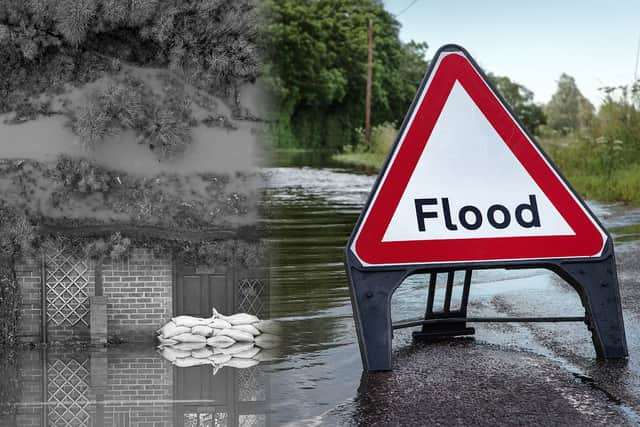Climate change: risk of four times as many extreme rainfalls in UK by 2080, Met Office study warns
and live on Freeview channel 276
Extreme downpours could happen four times as often in 2080, a new study says, if greenhouse gas emissions remain high and temperatures keep creeping upwards.
Climate scientists at the Met Office have found that for every degree of regional warming, the intensity of extreme downpours could increase by 5-15%. By the 2070s, deluges where more than 20mm of rain fall per hour could happen four times as often as they did in the 1980s.
Advertisement
Hide AdAdvertisement
Hide AdLondon usually receives between 40 and 50mm of rain in a month. In July 2021, 40mm fell on the capital in just three hours, flooding 31 Tube stations and 2,000 properties.
Across England, around three million properties are currently at risk from surface water flooding, with urban areas in steep catchments, such as Hebden Bridge in West Yorkshire, particularly vulnerable.
Met Office researchers used a high resolution model normally used for weather forecasting, to build a highly accurate picture of how local weather patterns could change over a 100-year timespan – between 1980 and 2080.


Previous less accurate and lower resolution models had found a smaller increase of two to three times as many extreme rain events by the 2070s, but climate scientist Professor Lizzie Kendon and her colleagues found a potentially more serious shift.
Advertisement
Hide AdAdvertisement
Hide AdProf Kendon said: “Being able to look at our projected future climate in such detail has unlocked an incredible amount of information and has shown how expected increases in intense rainfall events will actually manifest at local scale and for the coming years.
“Having this level of detail is crucial to ensure that we’re prepared for the possible extremes of the future,” she said.
Higher temperatures create more extreme rainfall because warmer air holds more moisture – roughly 7% for each degree Celsius – leading to a greater amount of water falling when clouds finally burst. Much of the UK’s wet weather comes from clouds which form over the Atlantic and are carried east on the jet stream, which is why the west and north of the UK are generally wetter than the south and east.
The researchers found regional differences in their climate modelling. North-west Scotland could see nearly 10 times as many extreme downpours in 2080 as it did in 1980, whereas the south of the UK could see around three times as many.
Advertisement
Hide AdAdvertisement
Hide AdProf Kendon warned against people trying to predict long-term trends through observation, adding: “The observed rainfall record in the UK is fairly erratic with a large amount of variability, these latest projections show that this is likely to continue through the century."
The modelling also showed that extreme downpours were likely to come in waves, because of natural climate variability adjusting conditions favourable for their occurrence.
“What we can see from the higher resolution output is an even more erratic frequency of extreme events each year, so this could mean we see clusters of record-breaking intense rainfall events, followed by a period when no records are broken," she said. “Despite the underlying trend, these pauses in the intensification of local rainfall extremes can last a surprisingly long time – even multiple decades.”
As well as helping planners and policymakers, the study would be useful for other climate scientists, trying to establish whether current extreme rainfall events were being caused by climate change.
Advertisement
Hide AdAdvertisement
Hide Ad“Our study highlights the complexity of how natural climate variability and human-induced climate change will come together in the extreme rainfall events we experience over the UK – it is far from a simple picture of more extreme events decade by decade as a steadily increasing trend,” Prof Kendon added.
Comment Guidelines
National World encourages reader discussion on our stories. User feedback, insights and back-and-forth exchanges add a rich layer of context to reporting. Please review our Community Guidelines before commenting.
